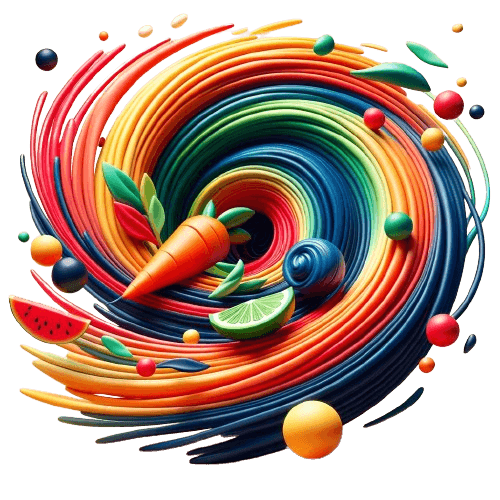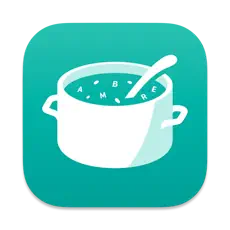Think Dirty - Beauty, Personal and household ingredient scanning app vs. Yuka - Mobile app
Think Dirty - Beauty, Personal and household ingredient scanning app
WE EMPOWER INGREDIENT-CONSCIOUS CONSUMERS TO CHOOSE THE SAFEST BEAUTY, PERSONAL + HOUSEHOLD PRODUCTS! Think Dirty® app is the easiest way to learn ingredients in your beauty, personal care and household products. Just scan the product barcode and Think Dirty will give you easy-to-understand info on the product, its ingredients, and shop cleaner options!
Yuka - Mobile app
Mobile app that scans barcodes of products. Yuka’s mission is to help consumers make better choices for their health. In doing so, it aims to drive manufacturers to offer better products.
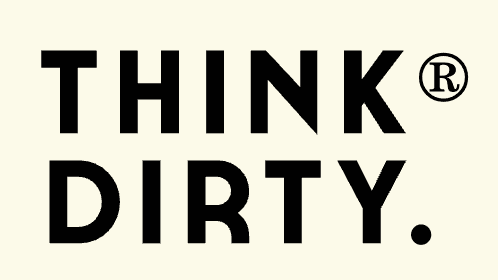
Reviews
Reviews
| Item | Votes | Upvote |
|---|---|---|
| No pros yet, would you like to add one? | ||
| Item | Votes | Upvote |
|---|---|---|
| No cons yet, would you like to add one? | ||
| Item | Votes | Upvote |
|---|---|---|
| works well | 1 | |
| Doesn't work for diets or allergens | 1 |
| Item | Votes | Upvote |
|---|---|---|
| mobile only | 1 |
Frequently Asked Questions
Think Dirty focuses on providing detailed information about beauty, personal care, and household products, allowing users to scan barcodes and learn about product ingredients. In contrast, Yuka also scans barcodes but emphasizes health-related choices and aims to influence manufacturers to improve their products. If your primary concern is beauty and household products, Think Dirty may be more suitable, while Yuka is better for overall health-related product choices.
Think Dirty is designed specifically for beauty and household products, which may provide a more tailored experience for users interested in those categories. Yuka, while also user-friendly, is mobile-only and may not cater to users looking for a broader range of product categories. Therefore, if you are focused on beauty and personal care, Think Dirty might offer a better experience, whereas Yuka is more general in its approach.
Yuka's mission is to help consumers make better health choices, which may imply a broader focus on health-related information across various product categories. Think Dirty, however, specializes in beauty and household products, which may limit its health-related insights to those specific areas. If your primary concern is health across a wider range of products, Yuka may be more comprehensive, while Think Dirty is more focused on ingredient safety in beauty and household items.
Think Dirty is an app designed to help ingredient-conscious consumers make safer choices for beauty, personal care, and household products. By scanning a product's barcode, the app provides easy-to-understand information about the product's ingredients and suggests cleaner alternatives.
The Think Dirty app works by allowing users to scan the barcode of beauty, personal care, and household products. Once scanned, the app provides detailed information about the product's ingredients, rating their safety, and offering cleaner options if available.
The main features of the Think Dirty app include the ability to scan product barcodes for ingredient information, a rating system for product safety, and recommendations for cleaner product alternatives. The app aims to empower consumers to make safer choices for their health and the environment.
Anyone who is ingredient-conscious and wants to make safer choices for their beauty, personal care, and household products can benefit from using the Think Dirty app. It is particularly useful for individuals with allergies, sensitive skin, or those looking to reduce their exposure to harmful chemicals.
Yes, the Think Dirty app is free to download and use. However, there may be in-app purchases or premium features available for users who want additional functionalities.
Yuka is a mobile app that scans barcodes of products to help consumers make better choices for their health. Its mission is to drive manufacturers to offer better products by informing users about the healthiness of the items they purchase.
Pros of Yuka - Mobile app include that it works well for scanning and evaluating products. However, it has cons such as being mobile-only and not being effective for diets or allergens.
Related Content & Alternatives
- 1
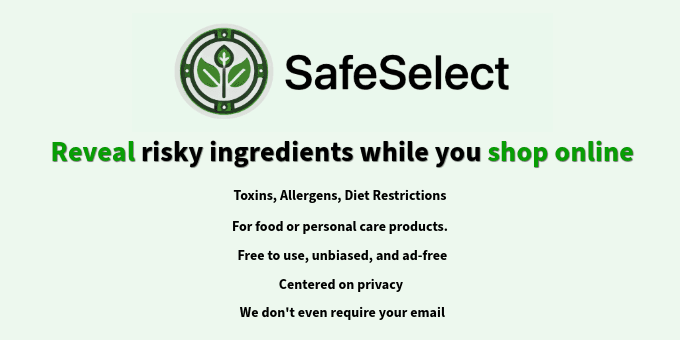 1.SafeSelect - Simple Safe Shopping. Keep toxic products out of your home
1.SafeSelect - Simple Safe Shopping. Keep toxic products out of your homeFeatures: - Checks Food and Personal Care ingredients for toxins, allergens, or diet restrictions on any site - Effortlessly auto-scans Amazon product pages for harmful ingredients - Highlight text and right-click for manual ingredient scans on any site - Scans images of ingredient lists for harmful substances - Update your user profile with allergy or diet information for personalized ingredient checks - Alerts for thousands of ingredients that are known or suspected to cause cancer, interfere with hormones, harm fertility, cause birth defects or developmental issues, trigger allergies, or are otherwise banned or restricted. - Free to use, unbiased, and ad-free. - Centered on privacy – we don't even require your email. SafeSelect: Your Wellness Ally in Smart Online Shopping Tired of researching product ingredients in food and personal care items? SafeSelect makes it simple. SafeSelect tells you which products are safe and which aren’t, so you don’t have to. Avoiding toxic ingredients? On a diet? Have allergies? SafeSelect has you covered. Regulations often lag behind science, leaving harmful ingredients in everyday products. It’s up to us to stay informed and protect our health. But keeping track of countless additives and staying updated with new research is overwhelming. SafeSelect helps you shop safely and intentionally. It takes the burden of research off your shoulders.
- 0
 2.Yuka - Mobile app
2.Yuka - Mobile appMobile app that scans bar codes of products. Yuka’s mission is to help consumers make better choices for their health. In doing so, it aims to drive manufacturers to offer better products.
- 0
 13.Toolstash
13.ToolstashToolstash is a free tool tracking app for homeowners & hobbyists. Use AI to add all of your tools with the snap of a photo and let Toolstash take care of everything else! Keep track of what tools you have & where you put them, remember which neighbor borrowed what, and find out who nearby has that obscure tool you need for your upcoming weekend project! - Track: Keep track of your all the tools you have and where you have them (garage, workshop, office, etc. - AI Snap: Simply snap a photo to add a tool. We'll automatically identify the tool and model numbers for you. - DIY Chat: Get DIY help right away based on the tools you have! - Auto-Categorization: We'll automatically organize your tools for you. - Borrow/Lend: Keep track of which friend or neighbor has your tools!
- 0
 32.GOSH
32.GOSHGOSH.app is a free AI Powered Price Tracking Tool and Price Tracking Chrome Extension. Track product prices and stock levels at any store, anywhere using the magic of AI. Get instant alerts when prices drop, or the product comes back into stock. Key Features - Get instant email or push notifications on product discounts. - Get instant email or push notifications on product re-stocks. - Install our free GOSH Price Tracking Chrome Extension (to quickly track the price of products from any store anywhere). Benefits - AI Powered Price Tracking: Never pay full price on a product again. - AI Powered Stock Level Tracking: Get access to the new stock before it sells out. - Free Price Tacker: Save big $$$ on products you buy often. Use Case Track product prices and stock levels at any store, anywhere. Get instant alerts when prices drop, or the product comes back into stock.
- 0
 36.Decopy AI
36.Decopy AIDecopy AI offers a comprehensive platform for detecting AI-generated content in both text and images, as well as verifying the origins of visuals. Key Features 1. AI Content Detector: Identifies whether text is written by AI or humans. 2. AI Image Detector: Detects AI-manipulated images. 3. Reverse Image Search: Finds the original source of an image across the web. Benefits - All of Decopy AI’s powerful detection tools are completely free to use. No subscriptions, no hidden fees—everyone can access and benefit from our AI Content Detector, AI Image Detector, and other tools at zero cost. - AI Detector tools are built on advanced algorithms that provide exceptional accuracy in identifying AI-generated content and images. Whether you’re analyzing text or visuals, Decopy AI delivers reliable results that you can trust. Use Case - Educators verify student submissions for AI-generated work. - Businesses check content authenticity for marketing. - Researchers trace image origins for verification. - Content creators prevent unauthorized use of their visuals.
- 0
 44.Presence
44.PresenceSleep better, relieve stress, and find purpose with Presence - your total guide to well-being. Take the next step on your journey with proven practices for integrated and holistic self-care. For 20 years, we've been empowering millions of people to balance their bodies, revive their minds, and activate their spirits. Now, for the first time, you can easily access our expert knowledge in one easy to use app. Whether you’re new to meditation and mindfulness, or you're an advanced practitioner, find your peace on a path that suits you. Relax with our best meditations, self-care tools, tips, and practices for your well-being based on our unique wisdom and scientific research. With an extensive library of knowledge for your mind, body, and spirit, plus new meditations featured daily, Presence is specially designed to help you discover your best self. Transform your health & well-being by: - Learning how to meditate - Finding immediate relief from daily stressors - Discovering your unique you - mind, body & spirit - Going deeper on your journey to self-discovery and purpose Uncover a range of popular topics including: - Better Sleep - Stress & Anxiety Relief - Peace & Calm - Confidence, Purpose & Success - Health, Weight & Increased Energy - Relationships & Connection - Creativity & Consciousness - Personal & Spiritual Growth Chopra's complete guide to mind, body and spirit comes with: - Over 500 meditations and practices representing our best tools - A variety of well-being experts to guide your experience - 5, 10, 20 and 30-minute sessions to suit your needs wherever you are - Our most popular well-being challenges including our 21-Day and Journey to Well-being programs - A quiz to discover your unique mind-body type and receive personalized content designed for you - Daily recommended sessions to build your practice - Monthly new programs and collections - Personalized tracking to help you stay motivated and see your progress
- 0
 47.NowKnow
47.NowKnowNowKnow helps you get market research done in hours instead of weeks. Ask questions, upload designs, and get thoughtful feedback from AI personas that represent your target audience. Key Features - Fast Results: Get detailed feedback within hours instead of waiting weeks for traditional surveys - Realistic Feedback: AI personas provide authentic responses based on real demographic profiles - Visual Testing: Upload images and designs to get feedback on everything from logos to interfaces - No Privacy Concerns: Since responses come from AI personas, there's no GDPR/CCPA compliance needed Benefits - Test More Ideas: Run multiple studies quickly and affordably - Iterate Freely: Adjust your questions and run new versions instantly - Target Precisely: Get feedback from specific demographic groups - Move Faster: Make informed decisions without long research delays Use Case Test everything from marketing messages to visual designs. Perfect for comparing UI layouts, A/B testing ads, getting feedback on logos, evaluating product mockups, and choosing the best social media content.
- 1
 2.Apple Health App
2.Apple Health AppThe Apple Health app provides a central and secure place for your health and fitness information, so it’s easily accessible and under your control. Features • Visualize and securely store health data from your iPhone, iPad, and Apple Watch as well as from compatible devices and third-party apps. • Browse interactive charts to review your health data over time and dive in for a deeper look. • Receive highlights on what matters most to you, like your steps, sleep, or vitals. • See at a glance how a given health metric is progressing, whether it’s increasing or decreasing over time, with trend analysis. • Share your health data with people important to you or those who are caring for you. • Create personalized sleep schedules, set a sleep duration goal, and track your progress over time. • Track your menstrual cycle with Cycle Tracking. Turn on notifications to tell you when your next period or fertile window is approaching. • Create a list of the medications, vitamins, and supplements you take, and receive reminders to log scheduled medications • Reflect on your state of mind by logging your momentary emotions, daily moods, and contributing factors. Get valuable insights into your state of mind and how it has changed over time with interactive charts. • Take standardized mental health assessments that are often used in clinics to understand your current risk for depression and anxiety and if you may benefit from a discussion with your care team. • Use the Health Checklist on iPhone to set up iPhone and Apple Watch to keep an eye on things for you. • See all your health records — such as allergies, immunizations, lab results, and more — in one place.* • Learn more about important health topics with educational articles.
- 3
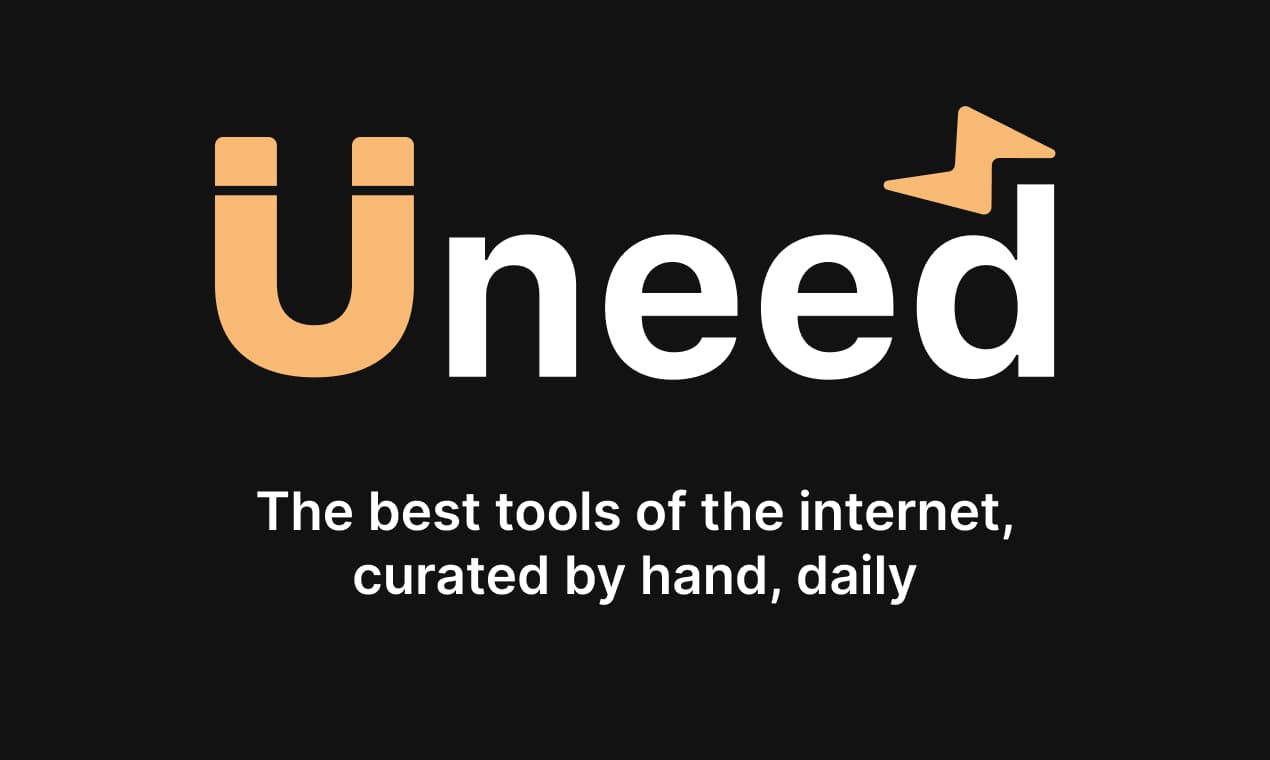 1.Uneed
1.UneedUneed is a platform where people can both discover new products and promote their own. It works a bit like Product Hunt, giving creators a way to get their products noticed. Every day at midnight PST, between 10 and 20 new products launch on the homepage. On launch day, products get prime visibility, but users can keep voting for them anytime afterward. Products are ranked daily, weekly, monthly, and yearly. The top three products in each ranking get badges—gold, silver, or bronze—displayed on their product pages. Popular products also get featured in Uneed’s weekly newsletter, which reaches over 9,100 subscribers. If you want to launch a product, you make an account and fill out the details. There are two ways to get your product live: wait in a free queue (and get assigned a random launch date) or pay $30 to skip the line and pick your date. Success comes from a strong launch day, keeping your page up-to-date, and encouraging people to vote. Adding special deals can also earn you a badge and keep interest alive. The community side of Uneed is built around upvoting products. The more you vote, the more power you gain. For example, a 5-day voting streak doubles your vote’s power, and a 100-day streak triples it while unlocking an avatar border. At 150 days, you get a free line skip; at 500 days, you get discounts on advertising; and at 1,000 days, your votes count as five. The platform covers categories like development, design, marketing, business, and personal life products. It’s just one person running Uneed, and you’re encouraged to vote for your own product. If you have questions, they’re easy to reach via email. In short, Uneed is a straightforward way to launch a product, gather feedback, and build an audience—without needing a massive following upfront.
- 3
 2.MicroLaunch
2.MicroLaunchMicroLaunch is a modern launch platform for early products: get feedback, traction and first customers over a month. Both ideas and product are scored separately. Your products get eventually roasted or boosted.
- 1
 5.AlternativeTo
5.AlternativeToAlternativeTo is a directory of software alternatives. If your app is a good alternative to some existing app, AlternativeTo is a great place to list to. They accept all types of software products - from websites to mobile and tablet apps and classic computer software.
- 0
 28.IndieFollow.top
28.IndieFollow.topIndieFollow.top is a place where indie makers and products shine. The products listed here are all handpicked with care. You could submit your awesome product for free.
- 0
 37.Mactools
37.MactoolsAn Exclusive list of the best Mac apps and tools. You can submit your Mac app or tool to get exposure to an engaged audience of Mac enthusiasts, developers, and professionals seeking new apps and tools to explore.
- 0
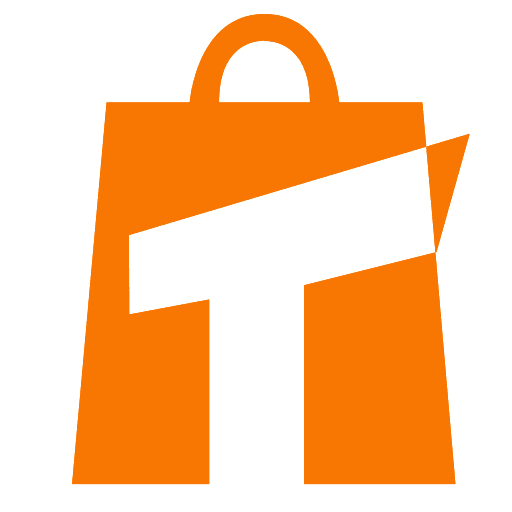 14.THunt
14.THuntTHunt.ai is a comprehensive solution designed to enhance your selling experience on Temu by providing invaluable data analysis and supplier search tools. THunt.ai empowers sellers by offering a suite of free tools that streamline the process of finding, analyzing, and optimizing product listings on Temu, enabling them to boost sales and improve their market strategy. This allows for a more efficient workflow, making it easier to stay ahead of the competition and maximize profits.
- 1
 2.Productivity Directory
2.Productivity DirectoryYour ultimate tool finder, providing a curated list of productivity apps and tools designed to enhance your efficiency and streamline your workflow. Your ultimate tool finder, providing a curated list of productivity apps and tools designed to enhance your efficiency and streamline your workflow.
- 0
 3.There's an AI
3.There's an AIThese days, AI directories are popping up all over the place. You’ve got huge lists—like that GitHub one —best-of-ai/ai-directories—and tons of sites trying to round up every AI tool under the sun. It’s a lot, right? Problem is, most of them are packed with meh tools. You dig through glitchy apps or overhyped stuff that doesn’t even work, and it’s a total time suck. Marketers like us? We don’t have time for that—we need tools that actually deliver. That’s where There’s an AI comes in. It’s not like those other messy directories. This one’s all about the good stuff—think of it like a stash of hidden gems, no junk allowed. You can navigate easily on different categories in it, jumping from content tools to ad optimizers without breaking a sweat. And the search? Oh, it’s clutch. You can type in whatever you want, and it pulls up only the best—no shitty tools clogging up your screen.
- 0
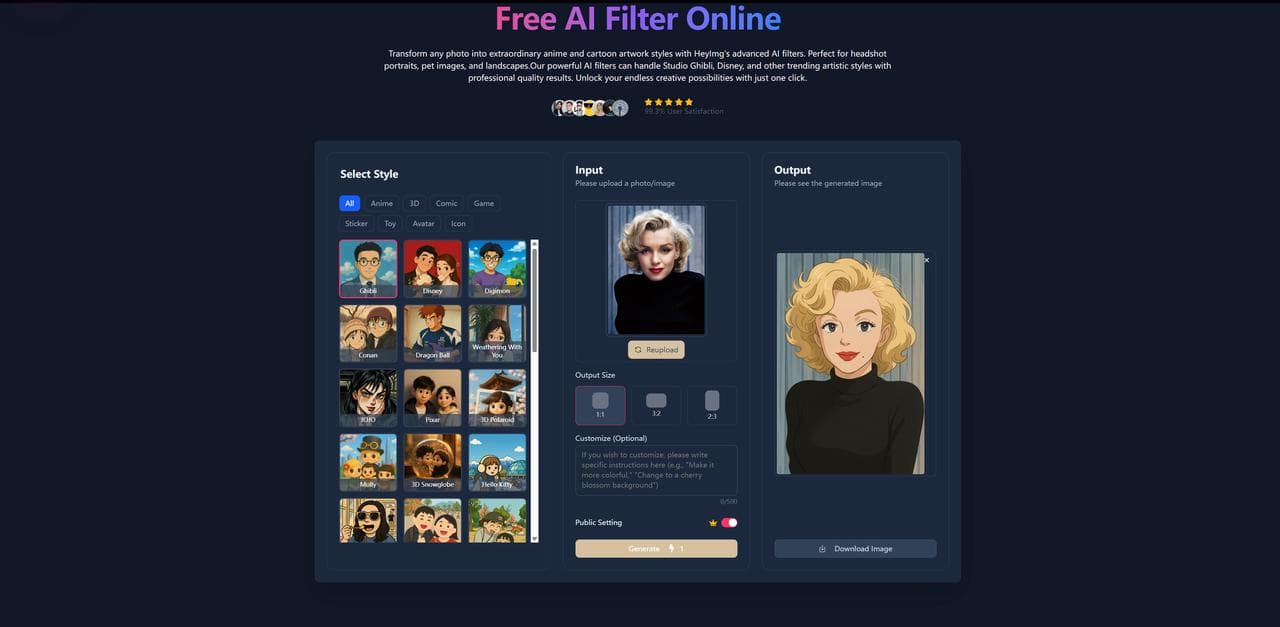 1.Hey Img
1.Hey ImgHey Image is an innovative AI-driven platform that helps you: - Generate AI images from your custom text prompts - Apply stunning AI filters to transform existing photos - Choose from diverse artistic styles and trending effects - Create professional avatars and illustrations with ease Hey Image, let creativity glow. AI filter platform for instant photo transformation.

